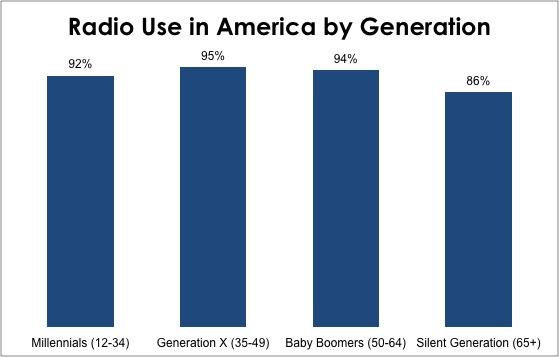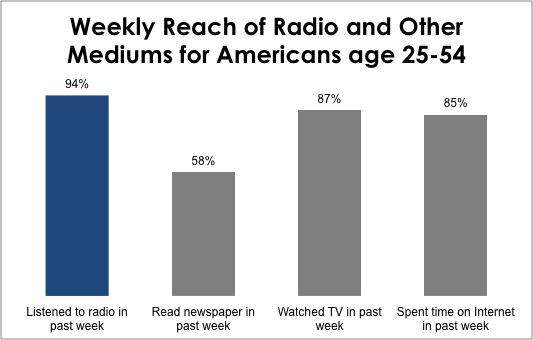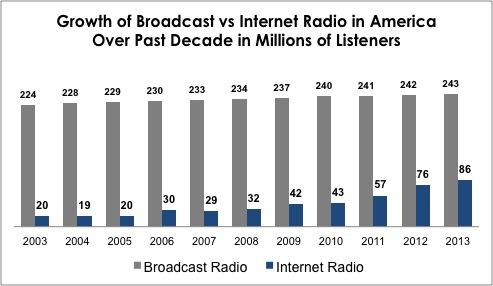But the data suggest something far different and radio is an especially pertinent example. From huge boxes that took pride of place in family living rooms the way flat screen TVs do today, to the peppy little transistor radios that ushered in the rock n' roll era, radio is considered a friendly, if soon-to-be-extinct format.
New technologies, however, has a way of extending the life of those platforms it was thought to replacing. In the case of radio, it turns out - and the following article explains - that Spotify, Pandora, iTunes et al may actually be complementary. That radio and those relatively new services stimulate demand in each other by acting as a kind of co-evolutionary echo chamber through which interest and demand are reinforced. Radio listenership has remained stable and is actually higher for Gen Xers than it is for Boomers.
While we are still in the nascent stages of understanding the full impact of technology on our lives, the chronic portents of doom for computers, email, television and radio may be even less accurate than Chicken Little's warning that the sky is falling. JL
Price Economics reports:
From iPods to Pandora, technology has produced a number of new ways of listening to
music that make radio seem outdated. Despite all the disruption and change, the size of radio's audience has remained stable.
Data source: Nielsen AudioFrom iPods to Pandora, technology has produced a number of new ways of listening tomusic that make radio seem outdated. But as this data from Nielsen Audio makes clear, radio seems to be just as much a part of young people's lives as it was for their parents: 92% of Americans ages 12-34 listen to the radio any given week.
Despite all the disruption and change in the music industry, the size of radio's audience has remained stable. Since 2004, annual market research has found that radio's weekly reach is roughly 90% of Americans every year. The 92% of Americans that radio reaches every weeklisten to an average of two and a half hours of radio per day. And radio's biggest users are not luddites. Among Millennials, the top listeners are 46% more likely to own a smartphone or tablet than their peers.
Twitter's fortunes will be decided by its ability to be the top destination for marketers looking to target a specific audience. But the business side of radio can still claim to be the way to go to reach a massive audience. Radio reaches more Americans every week than any other medium. A greater percentage of young Americans (ages 18-34) actually listen to radio every week (94%) than use the Internet (91%).
Data Source: ScarboroughThe key to understanding the health of radio is that new services like Spotify seem to complement radio consumption rather than replace it. Radio's user base has been stable or even grown slightly as Internet radio's popularity has risen. One survey cited by the radio business found that users of Pandora listen to 50% more traditional radio than non-Pandora users. The time Americans spend using radio, TV, and the Internet has increased from 7 hours a day in 2003 to 8 hours in 2013. At least for now, most music lovers have reacted to new options by listening to even more music rather than dropping radio.
Data Source: Arbitron RADAR surveys / Nielsen AudioMarketers of radio argue for its relevance in a future filled with streaming services by noting that DJs and radio personalities offer a personal connection thatother music options lack. Radio also remains so prevalent because it is the top choice of drivers. Internet streaming services are still young. But at least for now, perceptions of radio's death do seem exaggerated.























0 comments:
Post a Comment